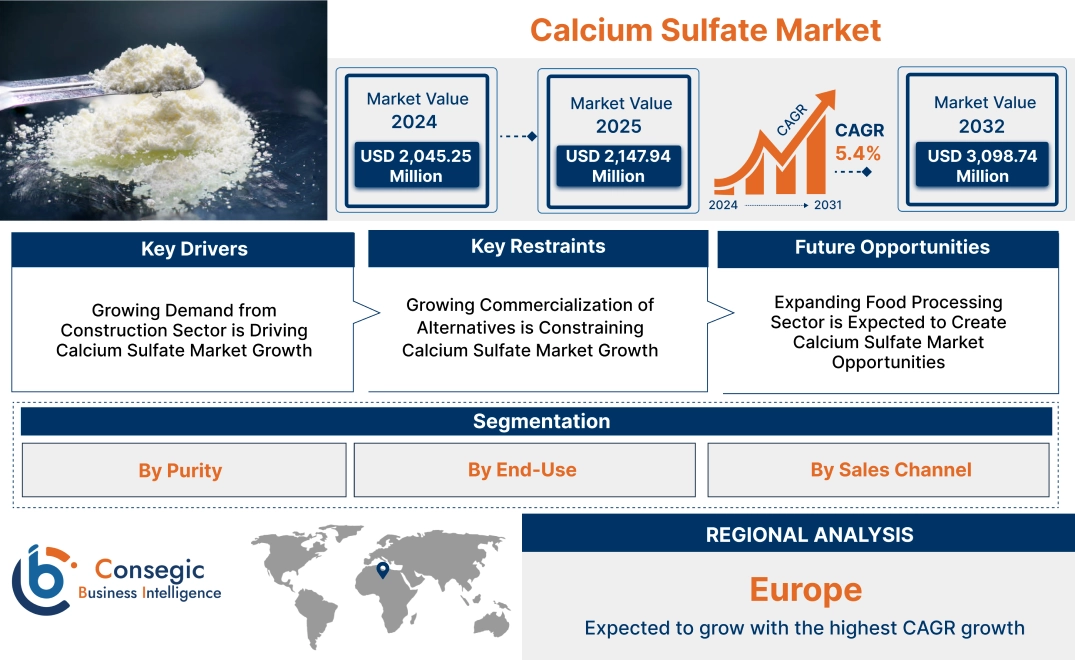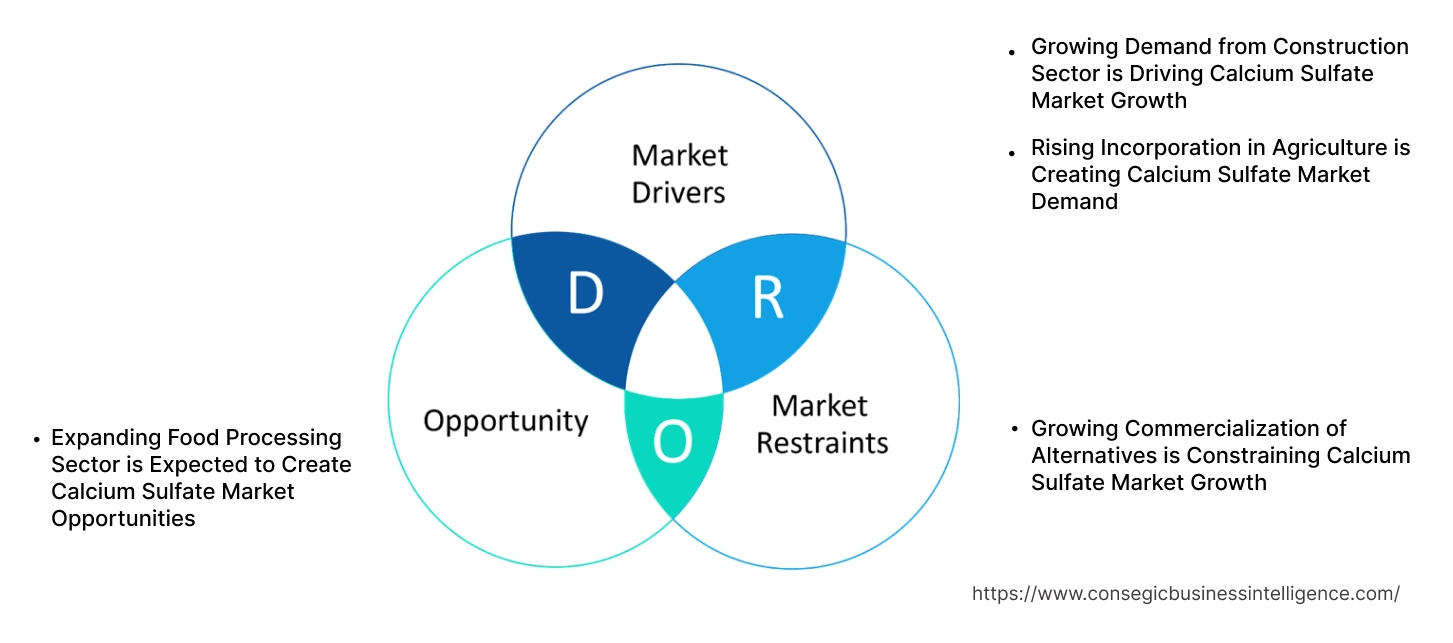Calcium Sulfate Market Size:
The calcium sulfate market size is growing with a CAGR of 5.4% during the forecast period (2025-2032), and the market is projected to be valued at USD 3,098.74 Million by 2032 from USD 2,045.25 Million in 2024. Additionally, the market value for 2025 attributes to USD 2,147.94 Million.
Calcium Sulfate Market Scope & Overview:
The chemical sulfate is an inorganic compound with the chemical formula CaSO4. It is commonly found in anhydrous, hemihydrate, and dihydrate forms. This compound possesses properties such as white or colorless crystalline solid, water solubility, and moderate hardness. It is available in both low purity and high purity. It is used in various industries such as construction, agriculture, food & beverage, chemical, and others. This compound is distributed through various sales channels such as direct sales, retail sales, and online sales to construction companies and food processing units. Additionally, preference towards non-toxic and eco-friendly additives in construction is growing further driving the calcium sulfate market demand.
Calcium Sulfate Market Dynamics - (DRO) :
Key Drivers:
Growing Demand from Construction Sector is Driving Calcium Sulfate Market Growth
The calcium sulfate is extensively used in the construction sector as an additive into cement, plaster and gypsum-based products. It also provides fire resistant and sound-proof finish in the housing construction. The housing construction is growing due to population growth, rising government support and urbanization further driving the market.
- According to S. Census Bureau, the housing construction in United States is increased by 3.1% in 2022 as compared to the year 2021. This growing housing construction is driving the use of calcium sulfate in cement and sound-proof finishing.
Hence, growing demand from construction sector is leading to calcium sulfate market expansion.
Rising Incorporation in Agriculture is Creating Calcium Sulfate Market Demand
In agriculture, calcium sulfate is used in crop production, livestock feed, and waste management. In crop production, it improves soil structures for better aeration and root growth. The crop production is growing due to rising food demand and technological advancements in farming, further driving the market.
- According to Food and Agriculture Organization, the global production of crops such as wheat, rice, and others is increased by 3% in 2023 as compared to the 2022. This growing crop production is driving the use of calcium sulfate for better yield and root development.
Thus, rising incorporation in agriculture is leading to calcium sulfate market expansion.
Key Restraints:
Growing Commercialization of Alternatives is Constraining Calcium Sulfate Market Growth
The commercialization of alternatives such as calcium carbonate, synthetic additives and dolomite is growing. They serve similar functions to that of calcium sulfate compound. Compared to this compound, calcium carbonate reduces soil acidity and improves crop yield effectively. In construction, synthetic additives such as polyvinyl acetate replace this compound in plaster, drywall and flooring applications, further reducing the demand. Further, dolomite, also known as calcium magnesium carbonate, is widely used in the livestock feed due to its low cost and easy availability. Hence, growing commercialization of alternatives is constraining the market growth due to low cost and easy availability.
Future Opportunities :
Expanding Food Processing Sector is Expected to Create Calcium Sulfate Market Opportunities
In the food processing sector, calcium sulfate is used as a food additive for improving the texture, taste, and nutritional value of food products. It is also used as a coagulant in tofu production. The food processing sector is growing due to rising consumer demand and government investments.
- According to India Brand Equity Foundation, the food processing sector is expected to grow with a compound annual growth rate of 8.8% by 2032 from 2023. This will create opportunities for the market due to the growing preference for nutritional food products.
Thus, expanding food processing sector is expected to create calcium sulfate market opportunities.
Calcium Sulfate Market Segmental Analysis :
By Purity:
Based on purity, the market is categorized into low purity and high purity.
Trends in Purity:
- According to calcium sulfate market trends, low purity is extensively used in highway construction to improve road quality.
- Use of high purity is growing in medicine and food supplements as per market trends.
The low purity segment accounted for the largest market share in the year 2024.
- The low purity compound has a purity level less than 98% and contains impurities such as silica and clay.
- In highway construction it is used in road base material to enhance road durability and load-bearing capacity. In agriculture, it is used for soil conditioning.
- Further, vehicle ownership and industrial development is growing which requires better road connectivity. To cater this, countries are expanding their highways.
- In 2023, according to American Road and Transportation Builders Association, the highway construction in the United States is increased by 16% as compared to the year 2022. This growing highway construction is driving the use of calcium sulfate for enhancing road durability.
- Thus, highway construction companies are widely using calcium sulfate to improve road quality thereby driving the segment.
The high purity segment is expected to grow at the fastest CAGR over the forecast period.
- The high purity compound has a purity level more than 98% and is a refined form, free from significant impurities.
- It ensures high performance and safety in sensitive applications such as medicine and food. It also has better solubility and bioavailability which improves absorption in pharmaceuticals and food supplements.
- In food it acts as a firming agent, dough conditioner, and calcium supplements.
- Further, regulatory standards are mandating the use of low toxic additivities in food products. To meet these standards, food manufacturers are increasingly adopting high purity calcium sulfate.
- Hence, high purity is increasingly used due to low toxicity and stringent regulatory standards. This will drive the segment for the forecasted years.
By End-Use:
Based on end-use, the market is categorized into construction, agriculture, food & beverage, chemical, and others.
Trends in End-Use:
- As per calcium sulfate market trends, calcium sulfate is extensively used in the walls, ceiling, and flooring application for fire safety.
- Adoption is growing in plant-based foods to improve texture as per market trends.
The construction segment accounted for the largest market share of 38.16% in the year 2024.
- In construction, calcium sulfate compound is used as an additive in the walls, ceiling, and flooring to provide structural stability. It is also used for fire resistance, enhancing building safety.
- It is low cost and also helps with the humidity control preventing cracks and shrinkages in the construction.
- Additionally, it is lightweight and easy to mold making it ideal for decorative finishes and premium wall coatings.
- Further, construction companies are preferring the cost-effective additive agent for flooring and ceiling further driving its adoption.
- Hence, construction companies widely used this compound for walls, ceiling, and flooring applications thereby driving the segment.
The food & beverage segment is expected to grow at the fastest CAGR over the forecast period.
- In food and beverage, calcium sulfate serves as a calcium fortifier in dairy as well as plant-based foods.
- It enhances protein coagulation and texture of various plant-based foods such as tofu, oats, and others.
- Further, awareness about animal welfare and focus towards sustainability is growing. Due to this, consumption of plant-based foods is increasing among the consumers.
- For instance, Plant Based Foods Association stated that E-commerce sales of plant-based foods is increased by 16.4% in 2024 from 2021. This growing consumption of plant-based foods is driving the use of calcium sulfate to improve taste and texture.
- Thus, consumption of plant-based foods is increasing, which is requiring calcium sulfate to enhance taste and quality. This will drive the segment for the forecasted years.
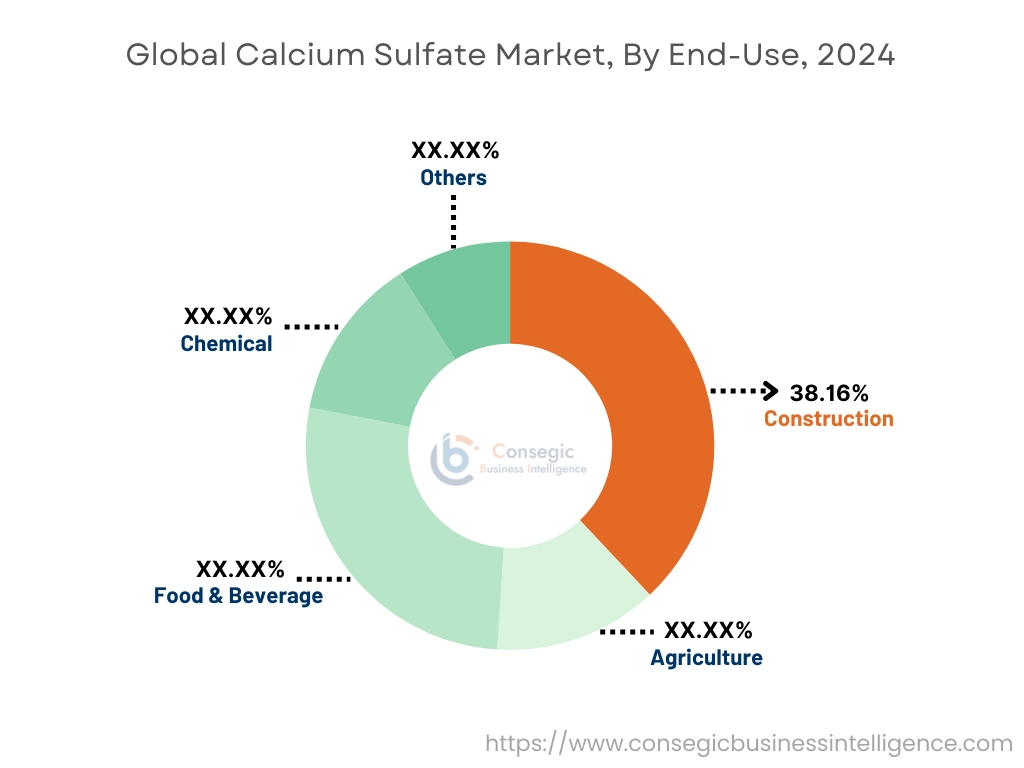
By Sales Channel:
Based on sales channel, the market is categorized into direct sales, retail sales, and online sales.
Trends in Sales Channel:
- Direct sales channel ensures bulk and consistent product supply to construction companies, food processing units and fertilizers manufacturers.
- Adoption of online sales channel is growing due to wider reach and customer convenience as per market trends.
The direct sales segment accounted for the largest market share in the year 2024.
- Direct sales are a type of sales channel where products are sold directly to customers without any intermediaries.
- Calcium sulfate is widely sold through direct sales to chemical companies, food manufacturers, and construction companies directly.
- Direct sales channel helps to build strong relationships with customers and ensures control over the entire sales process, from pricing to delivery. It also ensures higher margins and personalized offerings.
- Further, chemical manufactures and food processing units preferred direct sales channel to reduce distribution costs and customization of the product.
- Hence, direct sales channel is extensively used by chemical manufactures and construction companies thereby driving the segment.
The online sales segment is expected to grow at the fastest CAGR over the forecast period.
- Online sales are a type of sales channel that refers to the selling of goods and services online through digital platforms and marketplaces.
- Online sales is growing due to increasing digitalization in B2B transactions and the expansion of e-commerce platforms.
- Further, adoption of online sales is expanding due to convenience, bulk discounts, and direct access to manufacturers.
- For instance, according to Ecommerce Europe, the online sales in France is increased by 10.5% in 2023 as compared to the year 2022. This includes calcium sulfate which is distributed through online sales to construction companies, food manufacturers, and chemical plants.
- Thus, adoption of online sales is growing supported by increasing digitalization and customer convenience. This this will drive the segment for the forecasted years.
Regional Analysis:
The regional segment includes North America, Europe, Asia Pacific, Middle East & Africa, and Latin America.
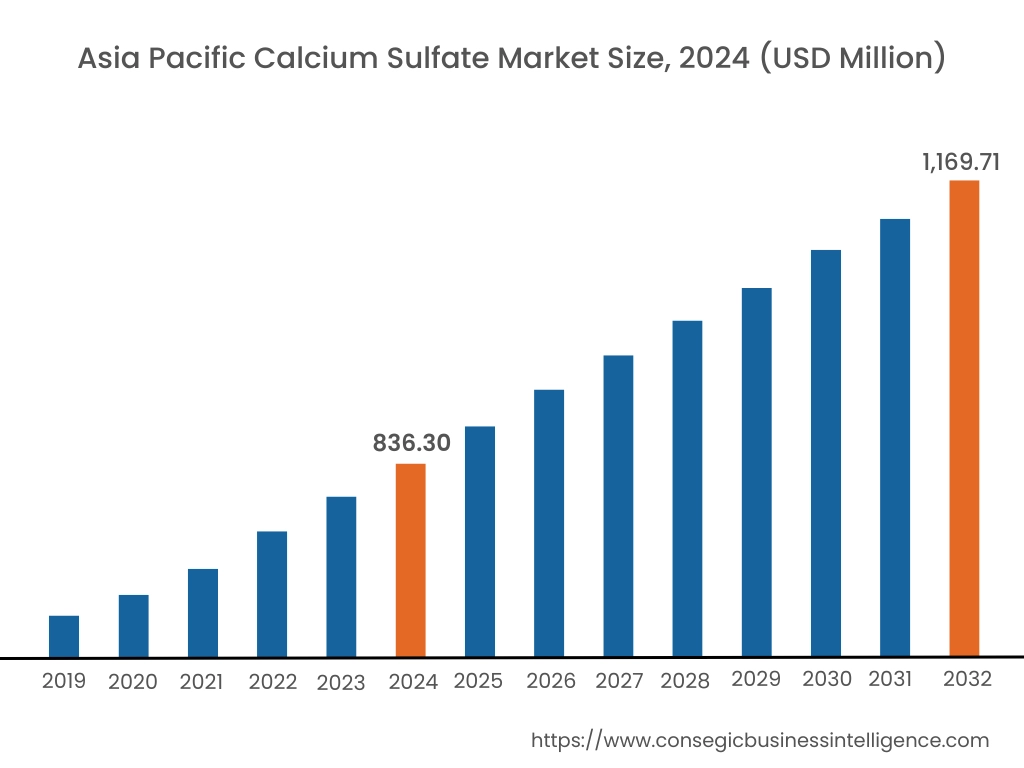
In 2024, Asia Pacific accounted for the highest market share at 40.9% and was valued at USD 836.30 Million and is expected to reach USD 1,169.71 Million in 2032. In Asia-Pacific, the China accounted for the highest calcium sulfate market share of 35.51% during the base year of 2024. As per analysis, Asia Pacific region holds a dominant position in the market due to expanding construction sector. The calcium sulfate is used in the construction sector for moisture resistance in flooring and reducing shrinkage cracks in the walls and floorings. Countries such as China, India, and South Korea leads the market in the region due to growing investments in the construction sector.
- According to National Bureau of Statistics of China, the investment in construction sector in China is increased by 4.4% in 2021 as compared to the year 2020.This growing investment in the construction is driving the use of calcium sulfate for moisture resistance and shrinkage prevention in walls.
Therefore, the Asia Pacific region is dominating in the market, supported by growing investments in construction as per analysis.
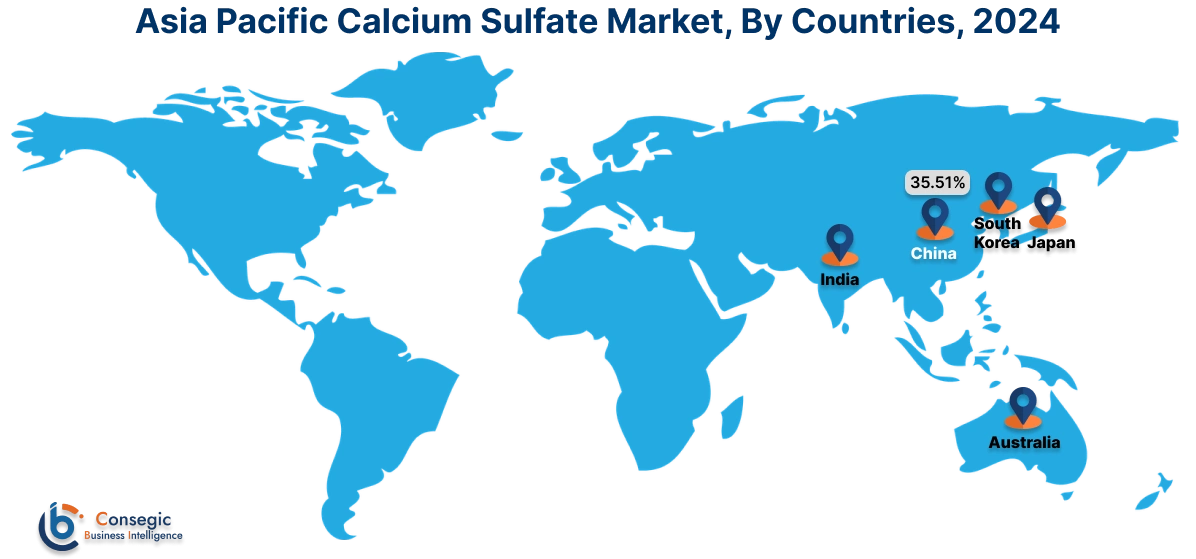
Europe is expected to witness the fastest CAGR of 7.4% over the forecast period of 2025-2032. According to calcium sulfate market analysis, Europe region is growing considerably in the market driven by advanced agriculture. The region is focusing on modern farming practices which require calcium sulfate for improving soil health. Also, governments are providing subsidies to farmers to boost crop production which requires better soil health, driving the adoption. Hence, calcium sulfate market share of Europe is expected to emerge rapidly through modern farming practices and government support as per analysis.
As per calcium sulfate market analysis, the North America region is growing rapidly driven by advancements in technology. Advanced purification techniques such as high-efficiency filtration and chemical refining ensure superior grade calcium sulfate. Additionally, 3D printing medical applications and self-healing concrete technology are expanding its usage. These innovations improve product efficiency, durability and regulatory compliances, fueling market growth in the region.
The Middle East & Africa region is experiencing moderate proliferation in the market driven by food and beverage industry. It is driving the use of calcium sulfate in the bakery, dairy and processed foods. The growing consumer preference towards fortified foods, bakery products and clean-label ingredients is boosting the adoption. Moreover, expanding trends related to the health-conscious diet is further supporting the market adoption across the region.
As per market analysis, Latin America is growing steadily in the market driven by expanding chemical industry. The calcium sulfate is used as a desiccant to remove moisture from organic reactions and solvents. In industrial catalysis, it acts as a carrier and filler in catalysts formulations for petrochemicals and specialty chemicals. Countries such as Brazil, Mexico, and Argentina are leading the market in the region supported by expanding chemical manufacturing plants.
Top Key Players & Market Share Insights:
The calcium sulfate industry is highly competitive with major players providing products to the national and international markets. Key players are adopting several strategies in research and development (R&D) and product innovation to hold a strong position in the global calcium sulfate market. Key players in the calcium sulfate industry include-
- Saint-Gobain (France)
- USG Corporation (United States)
- National Gypsum Services Company (United States)
- BNZ Materials (United States)
- Solvay (Belgium)
- Thermo Fisher Scientific (United States)
- Georgia-Pacific (United States)
- Ecolab Inc. (United States)
- Holcim (Switzerland)
- Xiamen Huilong Chemical Co. (China)
Calcium Sulfate Market Report Insights:
| Report Attributes | Report Details |
| Study Timeline | 2019-2032 |
| Market Size in 2032 | USD 3,098.74 Million |
| CAGR (2025-2032) | 5.4% |
| By Purity |
|
| By End-Use |
|
| By Sales Channel |
|
| By Region |
|
| Key Players |
|
| North America | U.S. Canada Mexico |
| Europe | U.K. Germany France Spain Italy Russia Benelux Rest of Europe |
| APAC | China South Korea Japan India Australia ASEAN Rest of Asia-Pacific |
| Middle East and Africa | GCC Turkey South Africa Rest of MEA |
| LATAM | Brazil Argentina Chile Rest of LATAM |
| Report Coverage |
|
Key Questions Answered in the Report
How big is the calcium sulfate market? +
In 2024, the calcium sulfate market is USD 2,045.25 million.
Which is the fastest-growing region in the calcium sulfate market? +
Europe is the fastest-growing region in the calcium sulfate market.
What specific segmentation details are covered in the calcium sulfate market? +
Purity, End-Use and Sales Channel are covered in the calcium sulfate market.
Who are the major players in the calcium sulfate market? +
Saint-Gobain (France), USG Corporation (United States), and Thermo Fisher Scientific (United States) are some of the major players in the market.
